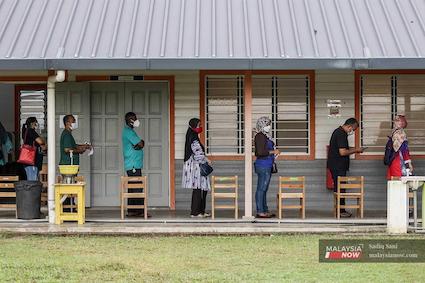A careful study of some seven million people who have been automatically registered as voters shows that only a minority are under 21 years of age, giving rise 
A demographic study of those automatically included as voters following the Undi 18 law shows the youngest age group making up less than one-fifth.
(MALAYSIA NOW) – to questions of whether the Undi 18 movement, whose goal is to get the younger generation to take part in the next polls, has only managed to further strengthen the traditional clout of much older voters.
A demographic breakdown made available to MalaysiaNow shows that only 16% of some 6.9 million new voters represent those in the 18-20 age bracket, the main target group of some political parties ahead of the next general election.
This is less than those aged 31 to 50, who represent about 23% of new voters, according to the figures studied by MalaysiaNow.
The majority of new voters are in the 21-50 age group.

Perhaps more interestingly, 60% of the new voters are Malays, followed by the Chinese (25%) and Indians (7.5%), while Sabah and Sarawak communities represent about 7%.
"What this essentially means is that Malay politics and issues for the community will continue to be the most crucial factor at the election, and this is going to be a challenge for some parties which have branded themselves as parties for the youth," said a source who studied the latest electorate data cited by MalaysiaNow.
The automatic registration of voters came into effect late last year, following the unanimous passing of a bill to lower the minimum voting age from 21 to 18, a move linked to political parties hoping to ride on support from younger Malaysians by championing issues close to the group.
Where individuals previously had to sign up to vote, automatic registration now ensures that every citizen over the age of 18 can automatically cast their ballots.
Some critics had said that this would not necessarily increase the number of voters at the coming polls, as the additional six million people were involuntarily included in the electoral roll.
The so-called Undi 18 bill was among others strongly promoted by former youth minister Syed Saddiq Syed Abdul Rahman, who went on to set up the Malaysian United Democratic Alliance, or Muda, which has branded itself as a party for the youth.
The demographics of the new voters – overwhelmingly Malay and not the "young voters" targeted by Undi 18 – are also likely to complicate ongoing negotiations between Muda and Pakatan Harapan (PH), the coalition which is already facing a crisis of confidence with the Malay electorate, according to recent surveys.

Last week, MalaysiaNow reported that several think tanks had presented the results of their surveys on voter sentiments to the PH leadership, showing that the coalition enjoys less than 15% of Malay support.
The outcome of the surveys is said to have rattled PKR, whose candidates are almost all being fielded in Malay majority seats.
"It does seem to suggest that political parties and coalitions, like in all previous general elections, have no choice but to return to the Malay electorate if they are to secure victory. Their future has little to do with the age of voters," said the same source.
A total of 21.1 million Malaysians, representing an almost equal number of men and women, are eligible to vote at the 15th general election.



No comments:
Post a Comment
Note: Only a member of this blog may post a comment.